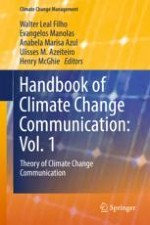2018 | OriginalPaper | Chapter
Getting Buy-In for Climate Change Adaptation Through Urban Planning: Climate Change Communication as a Multi-way Process
Authors : Leslie Mabon, Wan-Yu Shih
Published in: Handbook of Climate Change Communication: Vol. 1
Publisher: Springer International Publishing
Activate our intelligent search to find suitable subject content or patents.
Select sections of text to find matching patents with Artificial Intelligence. powered by
Select sections of text to find additional relevant content using AI-assisted search. powered by
